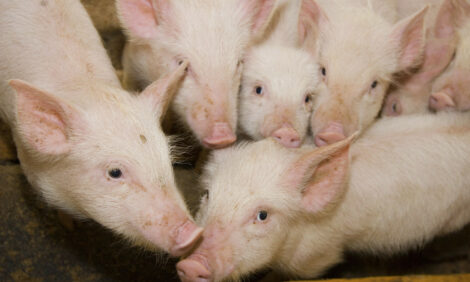



New Defra Poster Campaign: Pigs Spread Disease
UK - Pet pig owners and hobby farmers are being targeted by Defra in a new poster campaign warning them about the dangers of rapid spreading diseases affecting livestock.
|

In recent years, there has been a proliferation of numbers of Vietnamese pot belied and Kunekune pigs kept as pets, and many hobby farmers also house the odd pig or two.
Defra is concerned that pet pig owners and hobby farmers have not recorded their animals with the Department. As a result, this week, Defra will send out posters to every veterinary surgery in England.
The poster's key message is: "Pigs spread disease rapidly. If you keep pigs you must register with Defra. And if you start or stop keeping pigs, you must tell Defra."
During recent disease outbreaks, valuable veterinary resources went into finding out where unrecorded pet and hobby pigs were being housed. These were resources that should have been deployed eradicating disease, but instead vets were left having to knock on doors.
The poster campaign links with new rules for the identification of pigs which come into effect on November 1, 2003. All registered pig keepers should receive a leaflet explaining the rules. The leaflet was developed in consultation with BPEX, the National Pig Association and the British Pig Association.
From November 1, all pigs under one year of age moving direct to slaughter require identifying with their Defra herdmark. Pigs moving to another holding require identifying with a temporary paint mark.
All pigs over one year of age moving to any destination (slaughter, another holding, a collection centre, a market, or for breeding) require identifying with the Defra herdmark of the dispatching premises.
The Defra herdmark should be slapped onto each shoulder. Alternatively, pigs may be identified with an eartag or tattoo containing their Defra herdmark.
As of November 1, slaughterhouses must record all incidences of unmarked pigs. Slaughterhouses are obliged to make this information available to local authorities for possible prosecution.
Another change requires pig keepers to save their records for six years even after they stop keeping pigs. However, there are no changes to the 20-day standstill rules or the restrictions on feeding pigs swill.
Additional Information
The Pigs (Records, Identification and Movement) Order 2003 comes into effect on November 1 and covers England only. Similar legislation comes into effect in Wales on the same date.
Former Parliamentary Under-secretary (c) Elliot Morley announced the need for a review of existing pig identification rules following the presentation of an unidentified suspect pig at a slaughterhouse in June 2002 (PN 262/02). In November 2002, Defra launched a public consultation on the proposals to improve pig identification (PN 481/02).
EU rules governing the identification of pigs are laid down in EC Directive 92/102/EC.
The marking and identification of livestock is an important tool in tackling outbreaks of animal disease such as FMD. Non-compliance with identification and movement controls increases risks and is a criminal offence. Following investigations by local authorities into the unmarked sow at the centre of suspect disease in June 2002, charges were brought against two defendants at Rotherham Magistrates' Court in November 2002. Both pleaded guilty. A fine, prosecution costs and a two year conditional discharge were imposed. Defra will continue to support local authorities seeking to take vigorous action against those who fail to comply with the law.
- Copies of the leaflet and the poster and more information can be found on the Defra website.The leaflet can be accessed at http://www.defra.gov.uk/animalh/tracing/pigs and the poster can be found at http://www.defra.gov.uk/animalh/tracing/pdf/pigrulesposter.pdf (PDF Format)
Source: Defra - 27th October 2003













